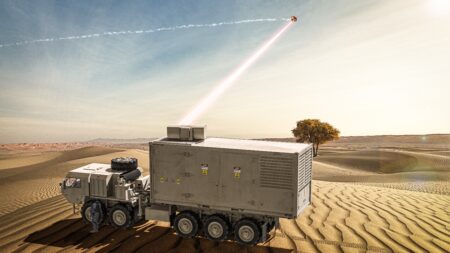The U.S. Defense Department released its strategy to accelerate the adoption of advanced artificial intelligence capabilities to ensure U.S. warfighters maintain decision superiority on the battlefield for years to come.
The Pentagon's 2023 Data, Analytics and Artificial Intelligence Adoption Strategy builds upon years of DOD leadership in the development of AI and further solidifies the United States' competitive advantage in fielding the emerging technology, defense officials said.
"As we focused on integrating AI into our operations responsibly and at speed, our main reason for doing so has been straight forward: because it improves our decision advantage," Deputy Defense Secretary Kathleen Hicks said while unveiling the strategy at the Pentagon.
"From the standpoint of deterring and defending against aggression, AI-enabled systems can help accelerate the speed of commanders' decisions and improve the quality and accuracy of those decisions, which can be decisive in deterring a fight and winning in a fight," she said.
The latest blueprint, which was developed by the Chief Digital and AI Office, builds upon and supersedes the 2018 DOD AI Strategy and revised DOD Data Strategy, published in 2020, which have laid the groundwork for the department's approach to fielding AI-enabled capabilities.
The new document aims to provide a foundation from which the DOD can continue to leverage emerging AI capabilities well into the future.
"Technologies evolve. Things are going to change next week, next year, next decade. And what wins today might not win tomorrow," said DOD Chief Digital and AI Officer Craig Martell.
"Rather than identify a handful of AI-enabled warfighting capabilities that will beat our adversaries, our strategy outlines the approach to strengthening the organizational environment within which our people can continuously deploy data analytics and AI capabilities for enduring decision advantage," he said.
The strategy prescribes an agile approach to AI development and application, emphasizing speed of delivery and adoption at scale leading to five specific decision advantage outcomes:
- Superior battlespace awareness and understanding
- Adaptive force planning and application
- Fast, precise and resilient kill chains
- Resilient sustainment support
- Efficient enterprise business operations
The blueprint also trains the department's focus on several data, analytics and AI-related goals:
- Invest in interoperable, federated infrastructure
- Advance the data, analytics and AI ecosystem
- Expand digital talent management
- Improve foundational data management
- Deliver capabilities for the enterprise business and joint warfighting impact
- Strengthen governance and remove policy barriers
Taken together, those goals will support the "DOD AI Hierarchy of Needs" which the strategy defines as: quality data, governance, insightful analytics and metrics, assurance and responsible AI.
In unveiling the strategy, Hicks emphasized the Pentagon's commitment to safety and responsibility while forging the AI frontier.
"We've worked tirelessly for over a decade to be a global leader in the in the fast and responsible development and use of AI technologies in the military sphere, creating policies appropriate for their specific use," Hicks said. "Safety is critical because unsafe systems are ineffective systems."
In January, the Defense Department updated its 2012 directive that governs the responsible development of autonomous weapon systems to the standards aligned with the advances in artificial intelligence.
The U.S. has also introduced a political declaration on the responsible military use of artificial intelligence, which further seeks to codify norms for the responsible use of the technology.
Hicks said the U.S. will continue to lead in the responsible and ethical use of AI, while remaining mindful of the potential dangers associated with the technology.
"By putting our values first and playing to our strengths, the greatest of which is our people, we've taken a responsible approach to AI that will ensure America continues to come out ahead," she said. "Meanwhile, as commercial tech companies and others continue to push forward the frontiers of AI, we're making sure we stay at the cutting edge with foresight, responsibility and a deep understanding of the broader implications for our nation."








